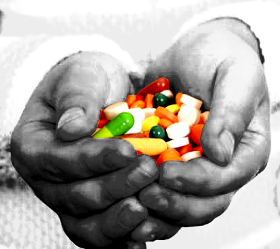Brain drugs drag down later life functions
 With the rise of so-called “smart drugs” in high schools and universities, a new study has shown that the temporary gains could be met be lasting losses.
With the rise of so-called “smart drugs” in high schools and universities, a new study has shown that the temporary gains could be met be lasting losses.
Thousands of students misuse prescription drugs and illegal stimulants to increase their attention span, memory, and ability to stay awake. The chemical advantage appears ever more popular due to peer pressure, stricter academic requirements, and worries over a tight job market.
But those who misuse the drugs risk long-term impairments to brain function, warn the authors of a review in the open-access journal Frontiers in Systems Neuroscience.
The research review focused on the lasting side-effects of the most popular focus-enhancing drugs, on the uniquely delicate developing brain of young people.
It was found that any short-term boost in mental performance due to the powerful stimulants came at a heavy cost, with evidence of a long-term decrease in brain plasticity, necessary for task switching, planning ahead, and adaptive flexibility in behaviour.
Methylphenidate is the most popular smart drug today, it is available on the Pharmaceutical Benefits Scheme (PBS) and has found a significant place on black markets too.
Sold mostly as ‘Ritalin’ to treat ADHD, it works by increasing the level of neurotransmitters in the nervous system.
But trials on rats have shown that young, developing brains are particularly sensitive to methylphenidate - even low dosages early in life can reduce nerve activity, working memory, and the ability to quickly switch between tasks and behaviours.
Such mental flexibility is important for complex learning, interpersonal skills, and work performance.
Another popular drug for kids is ‘modafinil’, sold through the PBS for the treatment of ADHD.
Believed to work by raising the levels of dopamine in between synapses of brain nerve cells, it can boost memory as well as the ability to work with numbers and do other mental tasks. But research also indicates that modafinil could have similar long-term undesired effects as methylphenidate on the developing brain.
‘Ampakines’ are set to become the hot new drug for growing minds, a class of drugs being developed by the US military with the aim of increasing alertness in soldiers.
Ampakines appear to improve memory and cognition in rats and healthy human volunteers, and are becoming the perceived ‘safe’ drug for students. But they are not without dangers for young people; uncontrolled use might over-excite the nervous system, damaging or killing nerve cells, caution the authors.
“What's safe for adults is not necessarily safe for kids,” warns researcher Dr Kimberly Urban.
“The human brain continues to develop until our late twenties or early thirties. Young people are especially prone to abuse smart drugs, but also more vulnerable to any side-effects. We simply don't know enough about the long-term effects of these drugs on the developing brain to conclude they are safe.”







 Print
Print